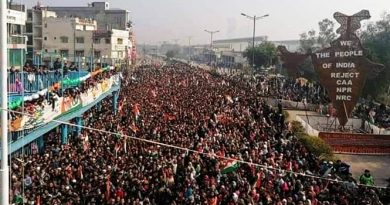Putin’s Party Suffers Defeats in Local Elections
Natalie Sherman
Staff Writer
Russia’s ruling political party, United Russia, lost almost one-third of their seats in the Moscow city assembly during elections held on September 8, reports the New York Times. Despite this major setback, the party still holds the majority of the seats in Moscow’s assembly and currently at 25, down from 38, including ten independent candidates backed by United Russia.
The biggest boost in support went to Russia’s still-popular Communist Party, which now holds 13 of the 45 seats in the Moscow assembly. MSN attributed these results to an unpopular decision by the Russian government last year to raise the pension age. The Communist Party remains popular among older Russians, the demographic most immediately affected by this decision.
The Kremlin is also losing popularity among Russia’s younger voters. Following a decision by Moscow’s Central Election Commission to bar several opposition candidates from the ballot, the city saw the largest protests in Russia since President Vladimir Putin announced his bid for a third term in 2012. The protests were met with violent police crackdowns in which thousands were arrested. Russia’s Investigative Committee declared the protests were a riot even though they were peaceful before police intervened.
The Central Election Commission claimed the opposition candidates were barred from running because they did not receive the 5000 signatures required to appear on the ballot. It appears to many, however, that United Russia was possibly behind the Commission’s decision.
The protests have shed a bad light on United Russia. As a result, all of the party’s candidates chose to run as independents in this election to bolster their chances. The strategy appears to have failed, however, as the party still suffered significant losses. Despite losing in Moscow, Reuters reports that United Russia still did very well in other parts of Russia, including St. Petersburg.
A notable figure among the candidates barred from participating in the elections is Lyubov Sobol. BBC reports that Sobol went on a hunger strike to protest her exclusion from the ballot. It is believed that she was excluded because of her association with the leader of Russia’s main opposition movement, Alexei Navalny.
Russia’s political opposition, most notably Navalny’s Anti-Corruption Foundation, is trying to shine a light on widespread corruption within Russia’s government. The move to bar opposition candidates from Moscow’s election displays this, as many lawmakers in Moscow’s assembly have previously been implicated in corruption schemes.
While there was only a meager 22 percent voter turnout rate for the Moscow city elections, these numbers are considered to be normal. In Russia, many voters feel very apathetic about the politics of their country. Putin is well-liked largely because he is seen as a competent leader who does not let other states take advantage of Russia. But, as July’s protests showed, discontent is growing.
Thus far, United Russia’s losses are mostly isolated to Moscow, but they are a symptom of nationwide discontent surrounding the stalling Russian economy and continued dishonesty from officials. Vladimir Putin, Russia’s president, is slightly more popular than the party that supports him with a 60 percent approval rating, which is down from its high point.
These elections reveal that United Russia has an image problem. The proven corruption of many of its officials makes Vladimir Putin look guilty by association. The opposition Anti-Corruption Foundation previously put out an entire documentary titled “Don’t Call Him ‘Dimon’” that takes aim at Dmitry Medvedev, the Prime Minister and official leader of United Russia.
Besides corruption, other political issues like the steady decline in wages have fueled a steady stream of protests that have been occurring since 2017. Radio Free Europe calls the summer of 2019 “Russia’s Summer of Discontent.” It is clear that political change is occurring in Russia and that many Russian voters desire better, more honest candidates.


